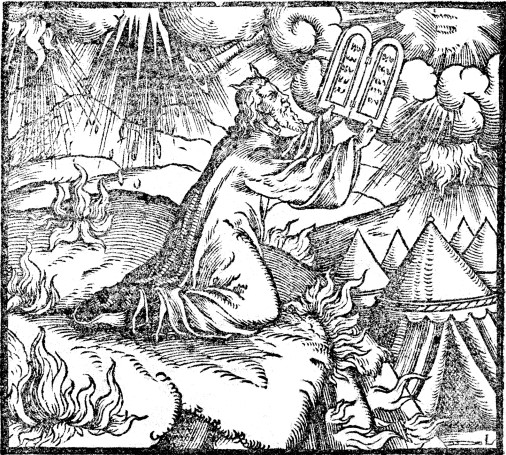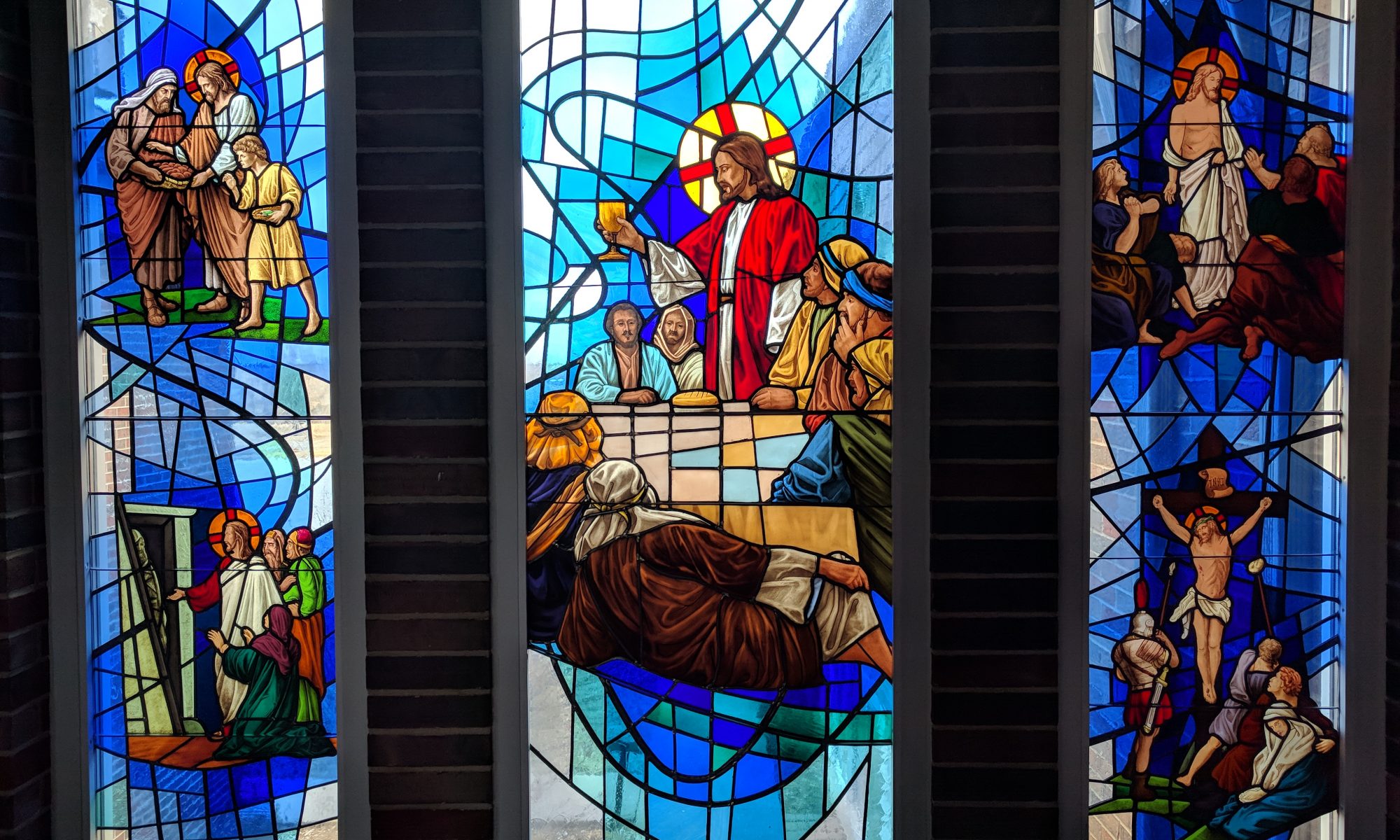
Lessons: Exodus 20:1-17, Romans 6:3-11, Matthew 5:20-26
Hymns: LSB 590, 562, 581, 732, 601
Grace, mercy, and peace to you from God our Father and our Lord and Savior, Jesus Christ. Amen.
Our church follows the lectionary—a series of readings appointed by the Church. The epistles and gospels appointed for each Sunday go back well before the Reformation. Same with some of the Old Testament readings. Sometimes, there is a clear and unified theme throughout the readings. Some days, there is not. There’s a clear connection between our Old Testament lesson and today’s Gospel. Both are heavy law, focusing on the Ten Commandments and their interpretation. The clearest gospel comes from our Epistle on Baptism.
The readings from the lectionary are usually just a few paragraphs and sit within a broader context. Today’s Gospel is a portion of Jesus’ Sermon on the Mount—one of several great discourses by Jesus recorded in Matthew. While our Gospel lesson is only seven verses long, Jesus’ Sermon on the Mount is three chapters long.
Today’s Epistle gives a beautiful treatment of God’s work in Baptism. In the previous chapter, St. Paul taught these glorious words, “As one trespass led to condemnation for all men, so one act of righteousness leads to justification and life for all men. For as by the one man’s disobedience the many were made sinners, so by the one man’s obedience the many will be made righteous. Now the law came in to increase the trespass, but where sin increased, grace abounded all the more, so that, as sin reigned in death, grace also might reign through righteousness leading to eternal life through Jesus Christ our Lord” (Rom. 5:18-21). Guided by the Holy Spirit, Paul then asks, “Shall we sin more that we can receive more grace?” The answer is “no” because we died to sin and rose to newness of life in Baptism.
In our Old Testament lesson, the people of Israel are encamped at the base of Mt. Sinai (Horeb), and Moses is receiving the Decalogue—the Ten Commandments—from God. God did not number them, but they are called the Ten Commandments later in Exodus 34:28. In our reading today, there’s no details on how the people of God received the Ten Commandments. It may be easy to assume they were happy, and everyone enjoyed hearing this Law. They were, after all, near God’s presence and they were God’s chosen people.
But let me read to you what happens next. Exodus 20:18-20 continues, “Now when all the people saw the thunder and the flashes of lightning and the sound of the trumpet and the mountain smoking, the people were afraid and trembled, and they stood far off and said to Moses, ‘You speak to us, and we will listen; but do not let God speak to us, lest we die.’ Moses said to the people, ‘Do not fear, for God has come to test you, that the fear of him may be before you, that you may not sin.’” The Israelites, having witnessed the Ten Plagues and were spared from death with the Passover, are now filled with fear that they will die in God’s presence. They don’t want God to talk to them; they want Moses to speak to them. And somewhat shockingly, God agreed to their request. Moses serves as a mediator between God and men.
Nearly 40 years later, in Deuteronomy 18:15-18, Moses recounts the events that had taken place when the Israelites were at Mt. Sinai. He said, “The Lord your God will raise up for you a prophet like me from among you, from your brothers—it is to him you shall listen—just as you desired of the Lord your God at Horeb on the day of the assembly, when you said, ‘Let me not hear again the voice of the Lord my God or see this great fire any more, lest I die.’ And the Lord said to me, ‘They are right in what they have spoken. I will raise up for them a prophet like you from among their brothers. And I will put my words in his mouth, and he shall speak to them all that I command him.” In these words, God is prophesying that Jesus, the Prophet, will come and teach them God’s Word. Jesus will come with tenderness, mercy, compassion, and love. He will bring peace to His people.
So when Jesus arrives, He will bring a new message that won’t be so strict, right? He will meet sinners with leniency never seen before by God’s people, right? He will gladly let people off the hook, right? In fact, Jesus will let us reinterpret the Ten Commandments to be merely the Ten Suggestions, right?
Well, that’s not what we witness in His preaching. When Jesus preaches His Sermon on the Mount, He explains the true interpretation of the Commandments. In today’s Gospel, Jesus demonstrates that these commandments are broken in what seems to be some very small ways. The Fifth Commandment—You shall not murder—does not just involve ending human life. This commandment is broken when people are angry with their neighbors, hurl insults at them, or use abusive language against them. And after our reading, Jesus continues with the Sixth Commandment—You shall not commit adultery. Looking at others with lust is breaking the commandment. Getting divorced for any reason other than sexual immorality is adultery. Marrying a divorced person is committing adultery. Jesus concludes this chapter in Matthew, saying, “I say to you, Love your enemies and pray for those who persecute you, so that you may be sons of your Father who is in heaven. For he makes his sun rise on the evil and on the good, and sends rain on the just and on the unjust. For if you love those who love you, what reward do you have? Do not even the tax collectors do the same? And if you greet only your brothers, what more are you doing than others? Do not even the Gentiles do the same? You therefore must be perfect, as your heavenly Father is perfect” (Matt. 5:44-48).
Thus the psalmist writes, “If you, Lord, kept a record of sins, Lord, who could stand? But with you there is forgiveness” (Psalm 130:3-4).
None of us can keep the Law’s demands. We have not only broken every commandment repeatedly, but we have also inherited sin from Adam. This sin, passed down from generation to generation, is known as original sin. The original sin of Adam corrupts all humans to this day. None of us is exempt.
So who will deliver us from our sins? Who can reconcile us to God? Who can render satisfaction for our transgressions? Who can make atonement for iniquity? Jesus Christ our Lord! Recall those beautiful words from Romans 5, “As one trespass led to condemnation for all men, so one act of righteousness leads to justification and life for all men.” Jesus died on the cross as the Lamb of God to take away the sins of the entire world. Jesus bore your sins in His Body and shed His innocent Blood as the ransom payment for your sins. Through Christ, you are set free from your sin, as we heard in Romans 6. By being baptized, your sins are drowned and they die, for you are united to Christ’s death in your Baptism. And then, you are also united to Christ’s own resurrection, arising in righteousness and holiness, for Christ Jesus has clothed you in His righteousness. Jesus now serves as your Mediator. He has intercepted your sin, so that you appear before God our heavenly Father as pure and perfect. He has opened Paradise to you, granting access to God our Father. Just as the Father is well-pleased with His Son, so now in Christ, God the Father is well-pleased with you. For you are baptized into Christ, and the Holy Spirit has worked faith in you. You have put on Christ. You now abide in Him and He in you (John 15:1-10).
My friends, we cannot overstate the importance of this Gospel. There’s no way to salvation without it. There are so many hurting people who are lost because they do not know what Jesus has already done for them in love. There are so many who figure they can explain their sins away to God. There are so many who think God will understand why they broke God’s laws, and so they do not figure they need Christ’s sacrificial payment. They are gravely mistaken.
It is tempting these days to think that it doesn’t really matter what people believe as long as they are sincere. But God doesn’t teach this. Jesus made it clear in today’s Gospel that He doesn’t allow for watered-down interpretations of the Law. He intensifies them to show that salvation cannot come from inside of ourselves. He gives us this strict Law so that we realize salvation must only come from Him.
This then shows us why Jesus is the perfect fulfillment of God’s promise to send a Prophet like Moses. While Jesus proclaims the Law in thunderous and seemingly threatening ways, Jesus also fulfilled the Law in our place. He kept every jot and title of the Law perfectly. He paid for all the sins we’ve committed, making for our peace. We now have peace with God. We can have peace with ourselves. We don’t need to beat ourselves up over all our failings that keep on accumulating. Jesus has washed them away. We can stand before God with a clear conscience, for we can claim Christ as our advocate.
Even our relationship with our neighbor is improved through Christ. While some will resent or reject us for being Christian, we are reconciled to our neighbors through Christ. We are cleansed from the pollution we’ve received from our neighbor’s sins. And we readily forgive them, as Christ has forgiven us. Remember the words of Jesus, “If you are offering your gift at the altar and there remember that your brother has something against you, leave your gift there before the altar and go. First be reconciled to your brother, and then come and offer your gift. Come to terms quickly with your accuser” (Matt 5:23-25). Don’t just agree to disagree. But be reconciled. Forgive one another. That way we may live together in peace and harmony. This fulfills the commandment to love. After all, we are God’s children together. It is a great joy that we are at peace with God—and with one another. How blessed it is when Christians dwell in harmony! Amen.
The peace of God which passes all understanding keep your hearts and minds in Christ Jesus to life everlasting. Amen.

